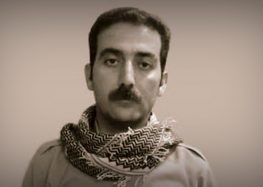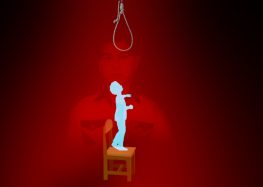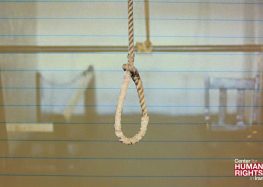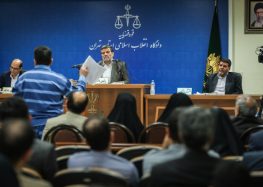Prisoners’ Families Plead for Stays of Executions Until Vote on Potentially Life-Saving Amendment
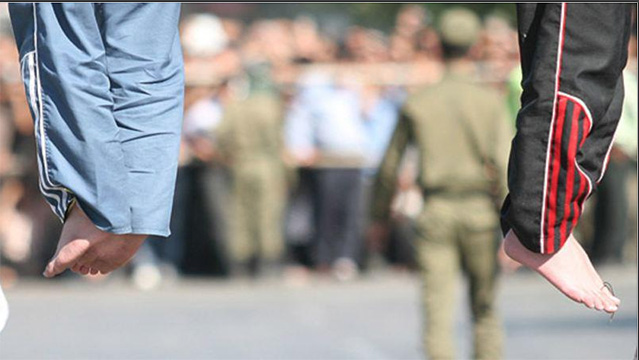
The families of prisoners facing imminent execution gathered in front of the judiciary’s headquarters in Tehran on July 26, 2017 to demand a halt to pending executions until Iran’s Parliament votes on a bill that would remove the death penalty for low-level drug-related convictions.
Iraj Ghobadi and Kavous Maleki were transferred to solitary confinement in Parsilon Prison in Khorramabad, Lorestan Province, on July 20 apparently in preparation for their executions, a source close to the Ghobadi family told the Center for Human Rights in Iran (CHRI).
“Our argument is that Iraj and Kavous did not have prior criminal convictions,” said the source, who spoke with CHRI on the condition of anonymity. “Wait a little until the new law is passed and Iraj’s death sentence will change to life in prison. Don’t take his kids’ hope away.”
The two have been on death row for the past five years after being sentenced in a trial without legal representation.
“We had no idea when they were sentenced, and when we got a lawyer, he said it was too late,” said the source. “We have to wait for the judiciary chief to order a halt to the executions.”
The men’s lives and those of up to 5,000 prisoners on death row for petty drug offenses could be saved by a proposed amendment to the Law Against Drug Trafficking that is due for a vote in Parliament.
“We tried to see our local officials, everyone from the Friday prayer leader to the head of the Martyrs Foundation, but none of them agreed to meet with us,” added the source. “They all said the decision is in the hands of the judiciary chief.”
The source said the police ordered the family to end their demonstration in front of the Palace of Justice in Tehran, which houses the judiciary and the Supreme Court, “but we are still hoping Iraj will not be executed and his two kids will not become orphans.”
“His mother is about to have a heart attack. His family is so upset, they are in shock. We had his two small kids with us in front of the Supreme Court building hoping that our pleas would make the officials feel pity, but so far no one has paid attention,” added the source.
Continued the source: “On the one hand, there is the sadness and hardship that comes after losing your father and the ruined family reputation. On the other hand, we have to consider how the kids will be able to deal with their father’s execution. I don’t know. I just hope God will have mercy on this young, innocent man.”
According to the informed source who spoke with CHRI, Ghobadi and Maleki were the second and third defendants in a drug trafficking case involving another defendant who went into hiding after being freed on bail. Iraj was the driver of the vehicle in which the drugs were discovered, but he has consistently argued that he was not aware of their existence.
Delays to Amendment Vote
In early July 2017, the Iranian Parliament’s Legal and Judicial Affairs Committee called on the judiciary to halt scheduled executions for prisoners convicted of lesser drug offenses until the pending amendment to the law is ratified.
“We expect the amendment to the Law Against Drug Trafficking to pass with a high number of votes because the majority of MPs are in favor of it,” said the committee’s Deputy Chairman Mohammad Kazemi during an interview with Shargh newspaper on July 5.
“Until the amendment’s final ratification, the lives of some prisoners will be in the balance,” he added. “Their lives could be spared when the [new] law is applied retroactively. For this reason, we have requested the judicial branch to halt these executions.”
Since its introduction in November 2016, the vote on the amendment has been repeatedly postponed due to strong opposition from drug enforcement officials and the judiciary. The latest vote was scheduled for mid-July, but last-minute changes to appease the judiciary’s concerns forced another delay.
In response to the judiciary’s demand for clarity on what quantity of drugs constitutes trafficking, the committee said the death penalty could be applied to those convicted of carrying “two kilograms of traditional drugs and 50 kilograms of industrial drugs.” Those carrying less would receive life sentences.
Amid the committee’s ongoing attempts to bring a vote to the floor, the head of the prosecutor’s office in Khorasan Razavi Province, Ali Mozaffari, accused the Parliament of trying to appease Western governments that have criticized Iran’s high rate of executions.
“The Western governments will not stop their animosity towards the Islamic Republic of Iran even if you make a thousand changes to the law,” said Mozaffari at a drug enforcement conference in Mashhad on July 5.
“The death penalty for drug crimes is on the basis of punishments for ‘Corruption on Earth’ commanded by the Quran and Islamic law,” he added. “It is in the interest of human society.”
Powerful hardline judicial officials have also opposed changes to the country’s death penalty policy.
“These are man-made laws that have not had perfect results. But it’s wrong to say that executions have had no effect,” said Judiciary Chief Sadegh Larijani on September 29, 2016. “If the judiciary had not been strict, we would have been in a far worse situation.”
Iran has one of the highest per-capita execution rates in the world. At least 567 people were executed in 2016, down 42 percent from the 977 who were in executed in 2015. The vast majority of executions were for petty drug-trafficking crimes, including for carrying small amounts of illegal drugs.

